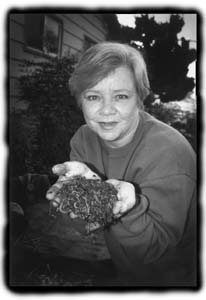
Photo by Christopher Gardner
Can red worms eat their way through the landfill crisis? The city of San Jose is banking on it.
By Michael Learmonth
LADONNA KANESHIWA snaps on a pair of latex gloves and reaches into a bin containing moist brown compost in her front yard. She pulls away a fiberous clump revealing a seething mass of red worms.
"There's all kinds of food in here. Those are coffee grounds from Starbucks. The worms love it. You know what a cup of coffee does to me?" she asked, serpents twisting in her hand. "What must it do to the worms?"
Ladonna's worms eat her newspapers and those of four of her neighbors. They eat all of the organic trash generated by her household of four, plus a helping of vegetable trimmings each month from Whole Foods in Campbell. The more she feeds them, the more they eat, breed and, yes, poop. These are all behaviors Ladonna encourages.
"I tell you I found a worm orgy in here one day," she said. "I reached in here and got a handful of worms, and every single one of them were mating. Look at all these cocoons," she giggled, sifting through the black matter. "This is the sign of a very healthy worm pile."
Ladonna may operate, at her suburban home at Payne and Greenbriar avenues, the largest red worm ranch in the Santa Clara Valley. They are an integral part of a fanciful garden in her tiny yard in west San Jose with flowers, fruit trees and a Japanese garden of smooth stones.
Ladonna is anxious to share the secret to her garden's abundance: plenty of care, rotting vegetables, old newsprint, coffee grounds, spoiled fruit and millions of red, slimy, squiggly worms. The kind that eat their weight in table scraps each day and produce the finest soil money can buy.
"I think it's because they're living and it's like nurturing, and that's the sort of person I am," Ladonna said.
Worms thrive in buckets in her driveway, beneath her fruit trees, in enormous compost bins in the front yard, and in a pit in the back yard where they are slowly eating a stack of cardboard boxes. But there's no need for branding or fenced corrals at this here ranch. Unlike earthworms, red worms stay put, eating almost any organic waste thrown their way, and propagating just enough to keep up with the amount of trash.
"It is fascinating. I just love it," she said. "It is so good for the environment everyone should do it."
Ladonna is not the only one fascinated. The city of San Jose's environmental services department is actively promoting worm ranching as a way of cutting into the 30 percent of landfill space taken up by table scraps, yard clippings, leaves and other organic matter. Paid for by county landfill fees, the University of California Cooperative Extension offers a free "master composter" course that teaches the virtues of worm ranching. In exchange for free tuition, master composters agree to help train others in the art of composting with worms. The city sells plastic worm bins at a discount to interested residents. Last year over 2,000 bins were sold.
San Jose and other local cities have turned to worms as another way to reduce the burden on landfills. In 1989, Assembly Bill 939 became law, mandating that municipal governments reduce their landfill dumping by 25 percent in 1995, and 50 percent from 1989 levels by the year 2000. Cities that don't make the cuts face a daily $10,000 fine.
"Most of the communities are on target for 1995, but the year 2000 is a really difficult goal to reach," said Ken Kelly, coordinator of the master gardener program. "This reduces the amount of waste before it reaches the curb."
Building a worm ranch is fairly simple. Bins range from a simple tub to the Cadillac of bins, the "Can O' Worms," which has three levels and automatically separates out the beneficial worm waste. A pound of worms will consume three to seven pounds of garbage a week.
Alisa Wade, coordinator of San Jose's worm composting program, keeps her worms on her back porch. "I chuck things in there every day, and it never gets full," she said, after admitting to have named "just a few of the cute ones." The city's next big worm demonstration and bin sale is scheduled for March. "Worms are getting really popular now," said Wade. "We've had no complaints from the SPCA."
Ladonna Kaneshiwa will sell a pound of her red worms, about a thousand, picked squeaky clean and in a fresh bed of shredded newspaper, for $15. She dispatches worm-keeping advice for free at redworms@worldnet.att.com. Ken's Bait & Tackle on Union Avenue sells 50 worms for $1.85 and will order a pound from a worm farm for $19.93.
[ Metro | Metroactive Central | Archives ]
![[Metroactive Features]](/features/gifs/feat468.gif)